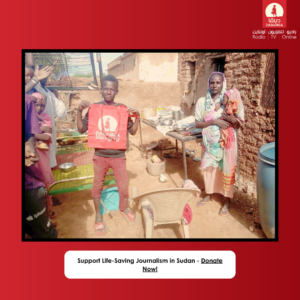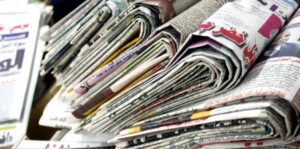State of Emergency: Censorship of Sudanese newspapers
Banning and censorship of newspapers over the weekend signals that media is the “first to pay the price” for the State of Emergency in Sudan.
 Sudanese newspapers in a kiosk in Khartoum on 16 February 2015 (Ashraf Shazly/AFP)
Sudanese newspapers in a kiosk in Khartoum on 16 February 2015 (Ashraf Shazly/AFP)
Banning and censorship of newspapers over the weekend signals that media is the “first to pay the price” for the State of Emergency in Sudan.
The National Intelligence and Security Service (NISS) summoned the administration of El Jareeda newspaper and has demanded that it reports daily to the offices of the security apparatus for correction and approval of the newspaper before it is printed. The NISS also demanded that the contents of its website of El Jareeda newspaper are also checked.
The administration of the newspaper has decided that it will neither go nor publish; they will meet today with a legal advisor, Nabil Adib, to determine a course of action.
The NISS has also been active elsewhere. Akhbar El Watan newspaper, the mouthpiece of the Sudanese Congress Party, has been banned for the fifth week in a row.
The Sudanese Journalists’ Network said that the Sudanese press is the “first to pay the price after the declaration of a State of Emergency, starting with editor-in-chief of El Tayyar newspaper Osman Mirghani who was detained on Friday night and the banning of El Jareeda newspaper.”
The network expects an intensification of gagging of newspapers and journalists in the coming days. It appealed to journalists to be more steadfast in their work.
The Sudanese Journalists’ Network said last week that 79 journalists have been arrested since December, including some who have spent a month or more in the prisons and detention centres.
The network said in a statement that there are newspapers such as El Jareeda, El Midan, Akhbar El Watan, and El Baath have not been accessible to the readers for weeks.
The director of El Ashigaa printing house, Mohamed Widaa, said that the price for a ton of newsprint paper has risen from SDG 75,000 to SDG 93,000 and described this as a disaster for the press industry.











 and then
and then